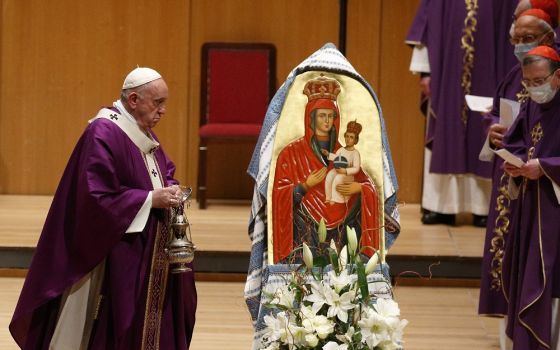Pope Francis answers questions from journalists aboard his flight from Athens, Greece, to Rome Dec. 6, 2021. (CNS photo/Paul Haring)
Less than a week after accepting the resignation of Paris Archbishop Michel Aupetit following reports of an "ambiguous" relationship with a woman, Pope Francis on Dec. 6 defended the recently ousted prelate, saying "we cannot condemn."
Aupetit, 70, offered his resignation to Francis last month after allegations surfaced that he had a relationship with a woman in 2012, prior to being made a bishop.
The pope said he had not accepted the archbishop's resignation "on the altar of truth, but on the altar of hypocrisy."
The Paris archbishop has maintained that his relationship with the woman in question was not intimate.
"If we do not know," Francis told journalists, "we cannot condemn. Who knows? Ugly, eh?"
Although Francis' defended the embattled prelate in flight, the Vatican previously announced on Dec. 2 that the pope had accepted Aupetit's resignation. On the plane, Francis said that both he and Aupetit are "sinners" and warned against judging without all of the facts being made known.
Francis' remarks came during an on-board press conference en route back to Rome after completing a five-day visit to Cyprus and Greece.
Prior to reports of Aupetit's questionable relationship, the prelate faced resistance within the Paris Archdiocese over his governing style, with two vicars general resigning within a four-month span.
Francis told journalists that the latest scandal surrounding the archbishop impaired his ability to govern. "When the gossip grows," said Francis, "it destroys a person's reputation, He will no longer be able to rule."
The pope also weighed in during the flight on Catholic relations with the Eastern Orthodox Church, the issue of migration and threats to democracy in the West — all of which were key themes during his visit to the two Mediterranean countries.
Francis said that every country in the 27-nation European Union has a responsibility to say how many refugees it is able to accept. While the pope acknowledged that it can be difficult to govern when a "wave" of new migrants arrive, he said countries must find a way to be clear about what they are able to handle, while also welcoming new arrivals and integrating them into society.
"If we do not solve the migrant problem, we risk the shipwreck of civilization," he said, repeating a line he had used a day earlier.
On Dec. 5, during his brief two-hour visit to the Greek-isle of Lesbos, Francis rebuked European leaders for failing to take responsibility for migrants, saying they had passed off the responsibility "to be shouldered by somebody else."
On the papal plane, the pope again issued a stern warning, saying if migrants were not accepted and integrated, "we are risking our civilization."
On the issue of relations with the Eastern Orthodox, Francis — who during his first day in Athens on Dec. 4, apologized for the past harms of Catholics against Orthodox Christians — said a potential second meeting with Russian Patriarch Kirill is "not a far horizon."
Francis elaborated, saying that "next week" an official from the Russian Orthodox Church would be traveling to Rome to help with arrangements for the potential meeting. Francis and Kirill became the first pope and Russian patriarch to meet in February 2016, signing a joint statement vowing to deepen relations between their churches during an encounter in Havana, Cuba.
"I am always willing. I am even willing to go to Moscow to dialogue with a brother," Francis told the journalists.
"With an Orthodox brother — whether he is called Kirill [of Moscow], Chrysostomos [of Cyprus], Hieronomous [of Greece] — he is a brother, we are brothers, and we say things face to face," Francis said.
While he said that brothers, at times, argue, "it's wonderful, because they come from the same mother, the mother church."
"They are a bit divided," Francis admitted. "But we must go together trying to work together, walking in unity and for unity."
Advertisement
During his 35-minute press conference, Francis reiterated that the divisions between Catholics and Orthodox are a "scandal."
As he traveled back home, the pope also emphasized his belief that "democracy is a treasure, a treasure of civilization," but warned that it is under threat by populist and nationalist forces.
In his first address in Greece — the birthplace of democracy — Francis warned of a global "retreat from democracy," pointing a finger at authoritarian leaders motivated by populist and nationalistic interests instead of the common good.
"Populism is starting to show its nails," Francis said during the Dec. 6 press conference. "Governments, both from the right and left, should be aware not to slip on the road of populism."
The pope said that populism has nothing to do with what he termed "popularism," which he described as "the expression of a nation's identity, folklore and values.”
"Populism, on the contrary, is when national values are sacrificed, they are watered-down in favor of a government that goes beyond national interests," said Francis. "We shouldn't water down our identity for national gain."




